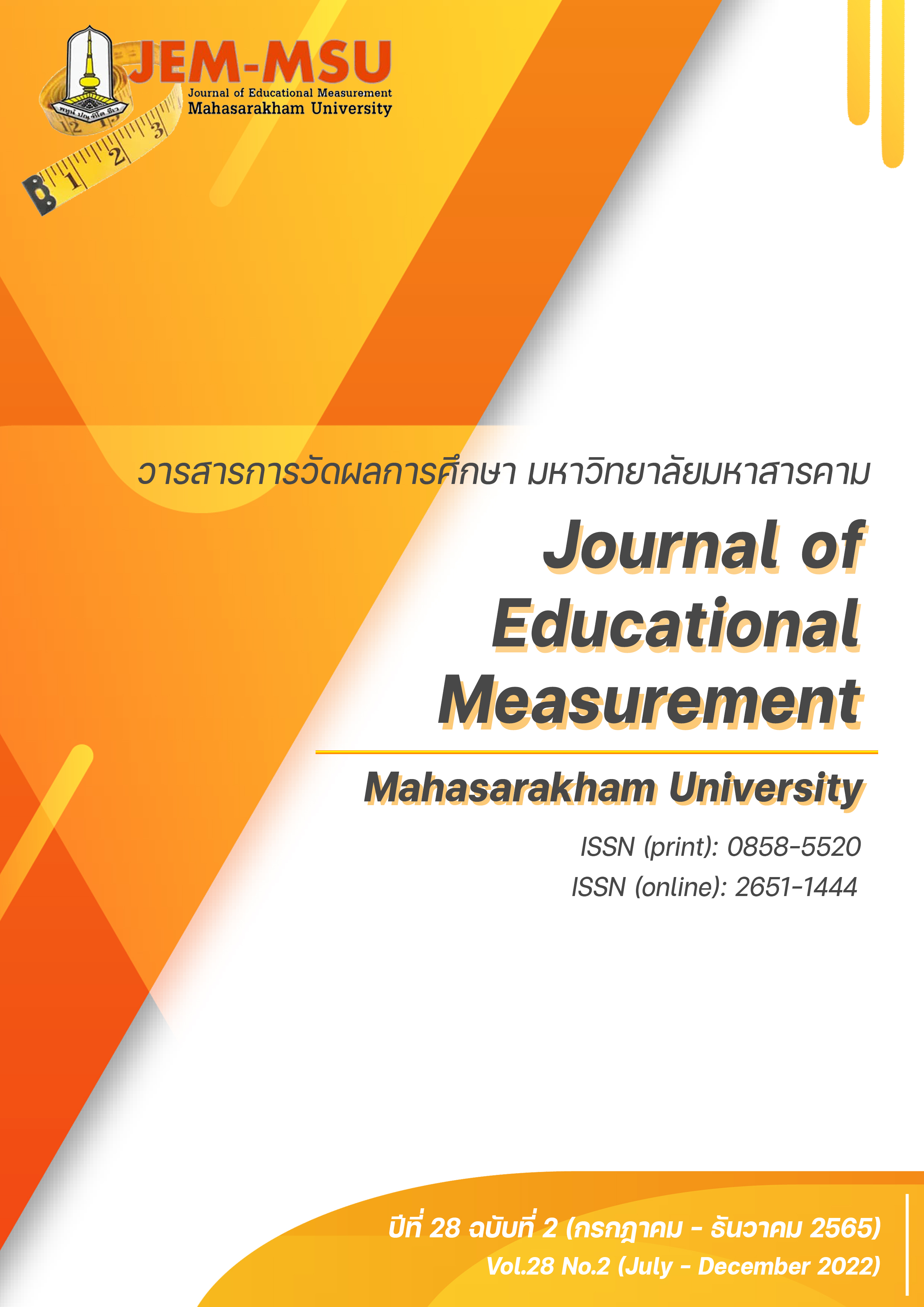Development of a Causal Relation Model of Futuristic Thinking for Grade Nine Students in Sisaket Province
Main Article Content
Abstract
This research aimed 1) to study and develop a causal relationship model of variables influencing futuristic thinking of grade 9 students, and 2) to study the guidelines on promoting futuristic thinking of grade 9 students. The research was divided into 2 phases. In Phase 1, Activity 1, the sample consisted of 8grade 9 students and 3 thinking experts, selected by purposive sampling. In Activity 2, the sample consisted of 860 grade 9 students from 12 schools in Sisaket Province in the second semester of the academic year 2020, selected by multistage random sampling. In Phase 2, the sample consisted of 8 grade 9 students and 3 thinking experts, selected by purposive sampling. The research instruments used in Phase 1 consisted of 1) a structured interview form for finding factors influencing students' futuristic thinking, 2) a questionnaire inquiring about factors influencing futuristic thinking with a scale for the students’ futuristic thinking. In Phase 2, the instrument used was a structured interview form for finding guidelines on promoting students’ futuristic thinking. The analysis of data employed descriptive statistics, simple correlation analysis (Pearson Product Moment Correlation) and reference statistics to test the structural equation model.
The results of the research were as follows:
1) The causal relationship model of futuristic thinking that had been developed was consistent with the empirical data. It was found that the factors having direct influence on futuristic thinking were emotional intelligence, personality, self-direction, attitude towards learning and democratic upbringing. The factors indirectly influencing futuristic thinking were personality, democratic upbringing. self-direction, achievement motivation and attitude towards learning.
2) In terms of guidelines on promoting students' futuristic thinking, the results can be summarized as follows: encouraging students to practice systematic thinking and teaching and learning activities should be various; emphasizing team activities; letting students learn from direct experience; teachers create awareness of students' learning both inside and outside the classroom and act as a role model; the school organizes a variety of activities for students to express themselves creatively; parents talk with their children to create understanding, encourage them in their learning, and give them opportunities to make rational decisions for themselves.
Article Details

This work is licensed under a Creative Commons Attribution-NonCommercial-NoDerivatives 4.0 International License.
The content and information contained in the published article in the Journal of Educational Measurement Mahasarakham University represent the opinions and responsibilities of the authors directly. The editorial board of the journal is not necessarily in agreement with or responsible for any of the content.
The articles, data, content, images, etc. that have been published in the Journal of Educational Measurement Mahasarakham University are copyrighted by the journal. If any individual or organization wishes to reproduce or perform any actions involving the entirety or any part of the content, they must obtain written permission from the Journal of Educational Measurement Mahasarakham University.
References
Chaiwongsa, A. (2005). A Study of the Characteristics of Future Thinkers of Grade 5 Students (Lamphun) [Master's thesis]. Srinakharinwirot University. (in Thai).
Charoenwongsak, K (2020). Future thinking (7th ed.). Success Media. (in Thai).
Chuenchit, J. (2007). Factors affecting future prospects of undergraduate students in the field of study. Faculty of Physical Education Recreation Srinakharinwirot University [Master's thesis]. Srinakharinwirot University. (in Thai).
Dumrongpanich, S. (2020). Mplus program and data analysis in behavioral science and Social Sciences. Chulalongkorn University Press. (in Thai).
Kham-ara, N. (2007). The relationship between some factors affecting the characteristics of future thinkers. of students in the 3rd grade Schools in United Campus Benchasiri Educational Service Area Office Bangkok District 1 [Master's thesis]. Srinakharinwirot University. (in Thai).
Khot-asa, K. (2016). The causal relationship model of futuristic thinking for students at grade level. high school Ubon Ratchathani Province [Master’ thesis]. Ubon Ratchathani Rajabhat University. (in Thai).
Kongkrob, S. (2015). Causal factors influencing future-oriented characteristics of Grade 3 students. Under the Office of Secondary Education Service Area, Region 27 (Roi-Et) [Master's Thesis]. Mahasarakham University. (in Thai).
Ministry of Education, (2010). National Education Act 1999 and its amendments (No. 2) B.E. 2002 and (No. 3) B.E. 2010. Express Transportation Organization of Thailand. (in Thai)
Munkham, S. (2016). Strategies for Teaching Strategic Thinking (5th ed.). Duangkamon Samai. (in Thai).
Office of the National Economic and Social Development Board. (2020). Economic Development Plan and National Society, Vol. 12 (2017-2021). Office of the Prime Minister. (in Thai).
Rungthanasak, H. (2009). Development of a causal relationship model towards future-oriented characteristics of students. Secondary school year 6 of schools under the Sisaket Educational Service Area Office, District 4 [Master's thesis]. Mahasarakham University. (in Thai).
Thongsawangjaeng, W. (2006). Development of a causal relationship model of future-oriented characteristics and Perseverance in studying of high school students Schools under the Office of the Eastern Basic Education Commission (Chonburi, Chachoengsao, Rayong, Nakhon Nayok) [Master's thesis]. Burapha University. (in Thai).
Wandee, W. (2011). Composition analysis of characteristics of future thinkers of students in Junior high school Component Analysis of Futuristic Thinker's Characteristics junior high school Under the Chiang Rai Educational Service Area Office, Region 4 [Master's thesis]. Chiang Rai Rajabhat University. (in Thai).
Worachet, K. (2005). A Study of the Relationship of Causal Factors Affecting Future-oriented Characteristics of Mathayomsuksa 3 Buriram Province [Master’ thesis]. Srinakharinwirot University. (in Thai).


